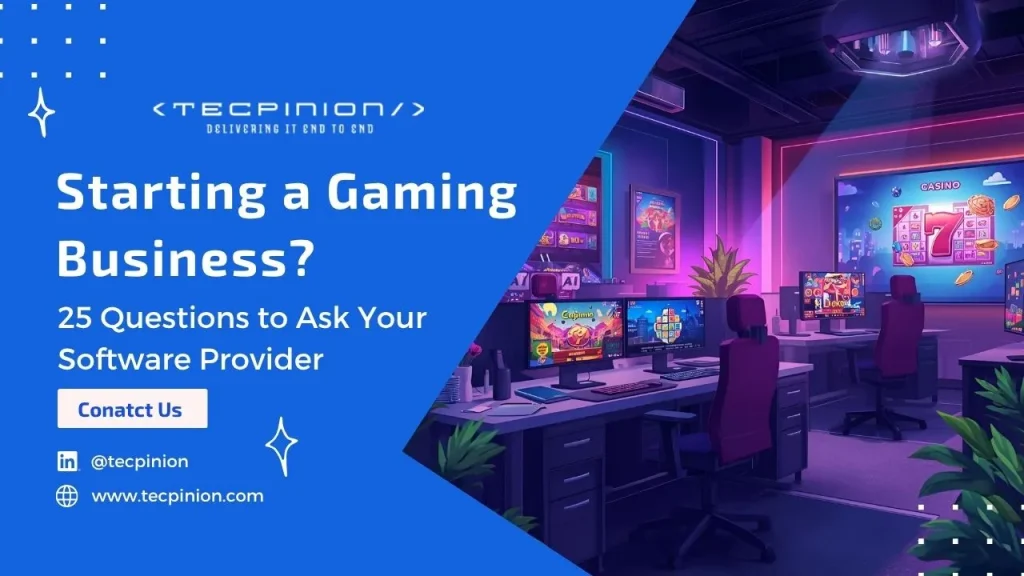Starting a Gaming Business? Ask These 25 Questions to Your Software Provider First

Table of Contents
Introduction
If you’re planning to start a gaming business, it’s crucial to choose the right software provider. Our blog guides you through key questions to choose a secure, reliable, and feature-rich platform.
Current Market Stats
The global online gambling market was valued at USD 78.66 billion in 2024 and is expected to grow at a CAGR of 11.9% from 2025 to 2030, reaching approximately USD 153.57 billion by the end of the forecast period.
What is the Gaming Business?
The gaming business refers to companies and platforms that create, host, or manage interactive games for players, usually for entertainment and sometimes for prizes or monetary rewards. It’s a fast-growing industry that spans traditional video games, online casinos, sweepstakes, and skill-based competitions.

-
Key Segments:
Understanding the main types of gaming helps identify opportunities and target audiences.
1. (Online Gambling/Casino): Digital casinos, poker, and betting platforms where players can wager real money.
2.Sweepstakes: A sweepstakes casino offers players the chance to win real prizes through games that use virtual currency or tokens.
3.Skill-Based Games: Games that reward players based on talent or strategy, rather than chance, sometimes with cash or other prizes.
4. Other Segments: Mobile games, social gaming, esports, and virtual worlds. -
How Gaming Businesses Operate:
Software Development: In order to execute games, manage user activity, and process payments, platforms depend on reliable software.
Player Management: Systems track player accounts, monitor activity, enforce rules, and ensure fair play.
Platform Security: Secure payment systems and anti-fraud measures protect both players and the company. -
Role of Software Providers:
Software providers construct the technology that underpins gaming platforms. Provided by them are:
1. Game engines and platforms
2. Payment gateways (including crypto integration)
3. Player management and loyalty systems
4. Security and compliance tools -
Revenue Models:
Gaming businesses use various ways to earn revenue:
Pay-to-Play: Players pay upfront or per game to participate.
Freemium: Games are free to play, but players can buy upgrades or in-game items.
Sweepstakes-Based: Players enter contests, often with small fees or tokens, to win prizes.
Subscription Systems: Players pay recurring fees for access to games or premium content.
Why Gaming Matters: Understanding Its Role and Impact

-
Economic Impact and Jobs:
Gambling creates billions in revenue and provides jobs in game development, software, marketing, and casino operations.
-
Innovation and Engagement:
AI, VR, and blockchain are some of the new technologies used in gaming and online gambling to give players entertaining and captivating experiences.
-
Responsible Gaming:
Ensuring safe and fair play is important in gaming. Following rules and promoting responsible gaming builds trust and keeps players safe.
-
Growth in New Markets:
Large opportunities are presented by nations such as the United States, India, and LATAM. The accessibility of new players is facilitated by the proliferation of digital payments, smartphones, and internet access.
Interested in Gaming?
25 Key Questions to Ask Before Starting a Gaming Business
Before starting a gaming business—like a new platform, game studio, or related service—you need to think about practical and strategic questions. Investors and entrepreneurs should review these carefully before getting started.
-
What type of gaming business do I want to start?
Understanding whether you want to launch a game development studio, a gaming platform, a mobile app, or a SaaS (Software as a Service) business is fundamental. Define your niche—will you be targeting casual gamers, competitive eSports players, or perhaps VR/AR experiences?
-
Is my business model legal in my target regions?
Ensure that your business model complies with laws and regulations in the areas you plan to operate. Different countries may have unique rules on game monetization, gambling, or content restrictions.
-
Do I need a gaming license, or can I operate under a sweepstakes model?
Depending on the business model, certain jurisdictions require a gaming license (e.g., for gambling or online casinos). Alternatively, you may consider a sweepstakes model, which often has fewer regulatory hurdles.
-
How much initial investment is required?
Calculate both your startup capital and ongoing operating costs. This includes game development costs, server infrastructure, marketing, legal fees, and employee salaries.
-
What platform features do I need?
Decide what core features your platform or game will offer. These could include multiplayer functionality, leaderboards, chat systems, in-game purchases, or social media integrations.
-
How do I ensure player data security?
Security is paramount. You must have robust security systems in place to protect sensitive data, such as players’ personal information, payment details, and in-game progress.
-
What payment gateways and currencies should I use for the business?
Identify the most popular and secure payment gateways for your target market. Additionally, decide on the currencies you'll support, especially if you're planning on targeting a global audience.
-
How can I integrate third-party games or content?
Think about whether you’ll want to allow third-party developers to publish on your platform. Integration tools or APIs will be necessary to make this possible.
-
What’s the best way to attract and retain players?
A successful marketing plan that includes strategies for both attracting new players (ads, promotions, influencer marketing) and retaining them (loyalty programs, updates, events) is essential.
-
How do I implement fraud prevention tools?
From chargebacks to cheating in games, fraud is a risk. Determine what fraud detection and prevention tools are necessary to maintain the integrity of your business.
-
What kind of analytics will help me measure success?
Key metrics could include player acquisition cost (CAC), lifetime value (LTV), retention rates, average revenue per user (ARPU), and engagement metrics like session length and frequency.
-
Should I choose a white-label or custom-built solution?
White-label solutions are cheaper and faster to implement, but custom-built platforms provide more flexibility and differentiation in the long run. Evaluate the trade-offs based on your goals.
-
When will the platform or game be ready for public release?
The expected time to launch is approximately 4 to 5 months, depending on the project’s complexity and team experience
-
How can AI and automation improve my operations?
Artificial intelligence can be leveraged for customer support (chatbots), player behavior analytics, dynamic difficulty adjustments, or automated content moderation.
-
What customer support options should I offer?
Offering customer support through multiple channels (email, live chat, social media, community forums) can improve player satisfaction and retention.
-
How do I handle compliance across different countries?
Different countries have different rules regarding gaming, data protection, and gambling. Ensure you have legal experts who can navigate these regulations to keep your business compliant.
-
What marketing strategies work best in online gaming?
Online marketing strategies like influencer partnerships, social media marketing, content creation, and SEO can be highly effective in the gaming industry. Consider also referral programs and viral challenges.
-
How can I ensure smooth gameplay across devices?
Players expect seamless experiences across mobile, desktop, and console platforms. Focus on cross-platform play, responsive design, and low latency for an optimal gaming experience.
-
What are the most profitable game types?
Depending on your target audience, certain genres may be more lucrative (e.g., mobile games with in-app purchases, subscription-based services, or premium console games). Do market research to identify profitable niches.
-
How do I manage player accounts efficiently?
An efficient player account system is crucial. This includes managing user logins, profiles, rewards, and transactions securely and smoothly. Single sign-on (SSO) or social media integrations could simplify registration.
-
What’s the importance of post-launch support?
Continuous updates, bug fixes, and new content are vital to keeping players engaged and attracting new users. Plan for regular post-launch updates and ensure your team is ready to respond to user feedback.
-
How can I differentiate my platform from competitors?
Think about how your platform or game will stand out. Is it through unique gameplay mechanics, a compelling story, a better user experience, or a specific community? Competitive differentiation is key to long-term success.
-
What are the risks, and how do I mitigate them?
Common risks include regulatory changes, technological issues, competition, and market shifts. Develop risk management strategies, including diversifying revenue streams and maintaining flexible business plans.
-
What ROI can I expect within the first year?
Be realistic about the revenue you can expect in the first 12 months, factoring in development costs, marketing, and scaling. Investors and partners will want to know when they can expect to see returns.
-
Who are the most reliable software providers in the market?
Research and select software providers who offer reliable game engines, server infrastructure, payment systems, and anti-fraud tools.
How to Choose the Right Gaming Software Provider
Consider whether the provider offers the necessary features, robust customer support, and the highest levels of security. Ensuring that they have comprehensive fraud prevention systems in place is crucial for protecting player data and safeguarding your operations. Security and compliance should always be top priorities.
Transparency is equally important—look for clear pricing structures with no hidden costs and reliable, 24/7 customer support to ensure smooth day-to-day operations. Furthermore, to maintain your platform’s autonomy and secure a fair financial agreement, conduct a thorough review of revenue-sharing models and ownership rights. By carefully considering these key factors, you can make an informed decision that supports your business’s long-term growth and success. Key points to consider:
- Experienced and well-known in the market
- Flexible, scalable, and easy to customize
- Safe, compliant, and protected against fraud
- Quick and helpful customer support
- Clear pricing and licensing
- Fair ownership and revenue-sharing options
Top 5 Gaming Software Providers
An overview of leading gaming software providers and what sets them apart:
1. Tecpinion

2. BetConstruct
BetConstruct is an experienced and trusted online gaming provider offering a large collection of casino games and exciting progressive jackpots. Their reliable and flexible platform is designed to support operators worldwide and easily adapt to different markets and regulations. With a strong focus on quality and innovation, BetConstruct helps businesses deliver a great gaming experience to players everywhere.
3. Pragmatic Play

Pragmatic Play, a leader in crypto-friendly gaming, enables operators to easily accept cryptocurrencies and profit from the rapidly expanding crypto gaming market. Their wide range of offerings includes captivating live dealer games and thrilling slots that never fail to captivate and amuse players everywhere.
4. SoftSwiss

Players from all over the world are enthralled with SoftSwiss’s exciting slot games and live casino experiences. The business sells trustworthy games. Their platform also supports both traditional and cryptocurrency payments, providing flexibility for a global audience.
5. EveryMatrix
EveryMatrix is well-known for its cutting-edge slots and mobile-friendly games, which provide captivating content that functions flawlessly on all platforms. With a strong focus on innovation and player experience, EveryMatrix helps businesses deliver engaging, seamless gaming across desktop and mobile devices worldwide.
Conclusion
A reliable and well-built platform is the foundation of any successful gaming operation. It ensures smooth performance, robust security, and seamless user experiences, all of which are critical for attracting and retaining players in a highly competitive market.
Partnering with a trusted provider like Tecpinion gives gaming businesses a big advantage. Tecpinion offers customizable, compliant, and AI-powered solutions that adapt to the changing gaming industry. Whether starting a new platform or growing an existing one, their technology helps businesses launch faster, work more efficiently, and stay flexible to try new ideas.


